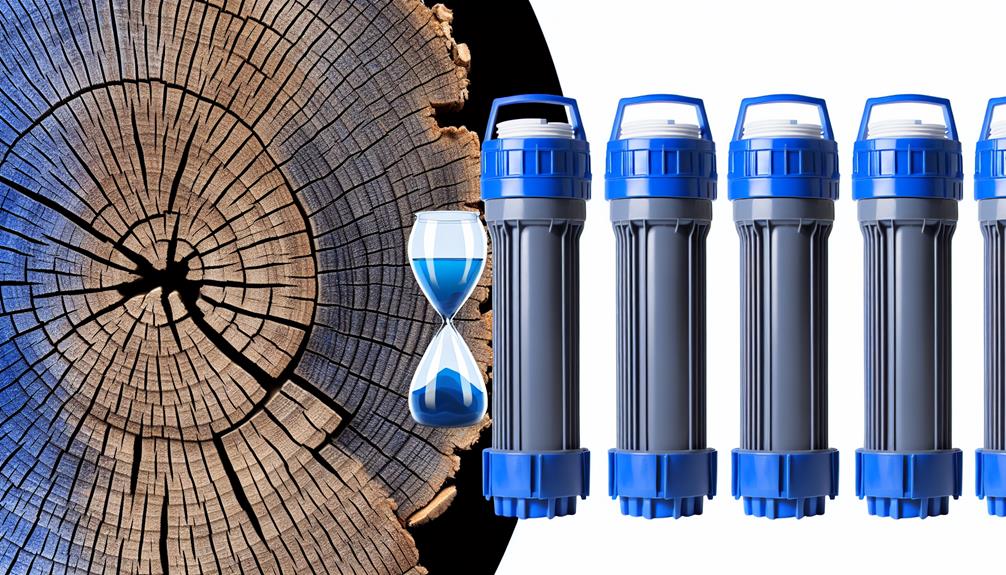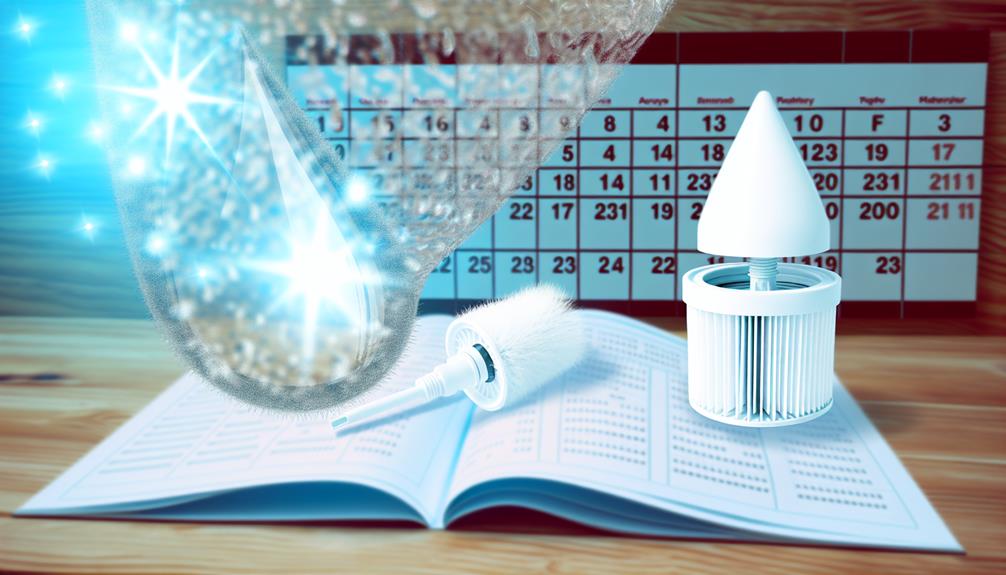As you navigate the complexities of maintaining your home's water quality, knowing when to replace your water filter is like understanding the subtle cues of a well-tuned instrument—critical yet often understated.
You've likely noticed the telltale signs: a drop in water pressure, a strange taste that wasn't there before, or perhaps the indicator light is signaling a change is due. These are just a few heralds that your once trusty water filter might not be performing at its peak.
But beyond the obvious, there are other, less conspicuous indicators that could compromise not just the taste but also the safety of your water. Stick with me, and let's uncover the subtleties that reveal when your water filter has reached its curtain call, ensuring you're never left questioning the purity of your next glass of water.
Unusual Odor Emanating
If you detect a foul or rotten egg-like smell in your water, it's likely a sign that your current filtration system is inadequate and a new filter is necessary. This odor typically indicates the presence of hydrogen sulfide, a gas that not only affects the water's aroma but can also compromise its quality. When you perceive such an unusual odor, it's a clear indicator that you need to change your water filter.
Additionally, if the water exudes a musty or moldy scent, it suggests that your filter may be harboring bacteria or mold, thereby necessitating a prompt replacement. Water filters usually have a finite lifespan, and an old filter can become a breeding ground for microorganisms, which contributes to these off-putting smells.
A strong chemical odor, such as chlorine, signifies that the filter water capability to remove contaminants has diminished. This is another critical sign that your water filter needs replacing. The presence of any strange taste or smell is a definitive warning that the integrity of your water is compromised.
Altered Taste Sensation
When you notice a metallic or salty undertone in your drinking water, it often indicates that your water filter is no longer performing effectively and requires replacement. An altered taste sensation is a clear sign that contaminants aren't being fully removed, pointing to the need to replace the filter. Taste, as a sensory parameter, is highly sensitive to changes in water composition, making it a reliable indicator of filter efficacy.
Drinking water should be free from unusual tastes; thus, a metallic taste often suggests that the filter isn't working optimally, possibly due to the saturation of its adsorptive media. Moreover, the presence of a salty taste may signify a breach in the ion exchange resins, leading to excessive sodium or potassium ions in the water. This is a technical indicator that changing the water filter is necessary.
It's prudent to regularly check for an indicator light, if available, which can alert you to the time to replace the filter. However, don't rely solely on these signals. Always trust your senses. If your drinking water exhibits any altered taste sensation, it's incumbent upon you to investigate and, most likely, proceed with a filter replacement to ensure the quality and safety of your drinking water.
Decreased Water Flow
A significant decrease in water flow from your filter can signal a blockage due to contaminant buildup, necessitating an immediate filter replacement to maintain water quality. When you notice that it's suddenly taking forever to fill a glass with filtered water, it's not just an inconvenience; it's a critical indication that your filter's efficiency is compromised.
Here's what to look for:
- Decreased Water Flow Rate: If you experience a noticeable drop in the water flow rate, it's a direct sign that the filter might be clogged.
- Low Water Pressure: When the previously robust stream of water becomes a trickle, this low water pressure could mean it's time to change the water filter.
- Extended Filtration Time: If filtering water is suddenly taking much longer than it used to, this lag suggests that replacing the water filter can't wait.
- Visible Contaminants: The appearance of floating particles or signs of black mold in the water are serious indications that your filter has become clogged and a new filter is urgently required.
Analyzing these signs technically, decreased water flow isn't merely a symptom of an aging filter but a clear message from your system. It's signaling that the filter's capacity to trap contaminants has reached its threshold, and to avoid any compromise to water quality, you must replace your water filter promptly.
Presence of Sediment
The presence of sediment in your filtered water often necessitates a prompt filter change due to its negative impact on the filter's effectiveness and water quality. When assessing your water filtration systems, it's vital to recognize the signs that your water filter may not be working correctly.
One clear indicator is the need to replace the filter when you detect the presence of sediment. Sediment can manifest as cloudy or murky filtered water, a telltale sign that your current filter is struggling to remove contaminants efficiently. You may observe a decrease in water flow and pressure, which is typically a result of sediment clogging the filter's pores. This impediment not only reduces the efficacy of the filtration process but also contributes to an increase in maintenance frequency and cost.
Moreover, if you notice an unpleasant taste or odor in your water, this is often attributable to sediment buildup within the filter. Such sensory changes are a direct indication that it's time to replace your water filter. Vigilance in monitoring these technical aspects of water quality will ensure that your water remains clean, clear, and safe for consumption.
Expiration of Filter Lifespan
Understanding the lifespan of your water filter is crucial, as various indicators suggest it's time to consider a replacement. These indicators include an activated indicator light on your fridge, a metallic or salty taste, unpleasant odors, reduced water pressure, and the presence of black mold. Your water filter's efficiency is finite, and monitoring its condition is essential for maintaining water quality.
To ensure optimal performance, consider these key factors in determining when to replace your water filter:
- Activated Indicator Light: Refrigerator Water Filters often feature an indicator light that will let you know when the filter has reached the end of its useful life.
- Taste and Odor Changes: A metallic or salty taste or the presence of unpleasant odors can indicate mineral buildup and a compromised filter.
- Water Pressure: A marked decrease in water pressure may signal a clogged filter due to the accumulation of contaminants.
- Visible Mold: The presence of black mold in the water is a clear sign that the filter is no longer providing safe, clean water.
Most manufacturers recommend replacing water filters every six months, or after a certain amount of water—often several hundred gallons—has been filtered. The exact filter lifespan can vary, depending on the wide range of contaminants in your water and the volume of water your household consumes.
Always stay alert to these signs, as they're reliable indicators that it's time for a new one.

